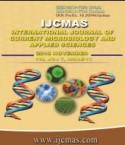


 National Academy of Agricultural Sciences (NAAS)
National Academy of Agricultural Sciences (NAAS)

|
PRINT ISSN : 2319-7692
Online ISSN : 2319-7706 Issues : 12 per year Publisher : Excellent Publishers Email : editorijcmas@gmail.com / submit@ijcmas.com Editor-in-chief: Dr.M.Prakash Index Copernicus ICV 2018: 95.39 NAAS RATING 2020: 5.38 |
Sorghum downy mildew (SDM) caused by the oomycete, Peronosclerospora sorghi, is one of the destructive diseases that afflict maize. P. sorghi infects a susceptible host, hindering its growth and altering its morphology. To understand the molecular basis of the compatibility interaction between P. sorghi and maize, a comparative proteomic approach (2D-PAGE) was employed between the mock-inoculated (control) and SDM-inoculated leaves in the susceptible genotypes of maize (UMI79 and CM500). Seventeen spots showed a significant difference in the abundance of proteins in control and inoculated samples were further analyzed with MALDI-TOF/MS. The resulting peptide mass fingerprint was subjected to MASCOT analysis and it was found that most were related to stress that includes lipoxygenase and DEAD-box ATP-dependent RNA helicases, microtubule-associated protein and probable protein disulphide isomerase. Additionally, proteins involved in the cell cycle/endoreplication such as DNA topoisomerase 6 subunit A and retinoblastoma-related proteins were differentially expressed during infection. The possible roles of these proteins in response to P. sorghi infection in maize are discussed.
 |
 |
 |
 |
 |